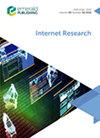“Is COVID-19 a hoax?”: auditing the quality of COVID-19 conspiracy-related information and misinformation in Google search results in four languages
IF 5.9
3区 管理学
Q1 BUSINESS
引用次数: 0
Abstract
PurposeAccurate information is the basis for well-informed decision-making, which is particularly challenging in the dynamic reality of a pandemic. Search engines are a major gateway for obtaining information, yet little is known about the quality and scientific accuracy of information answering conspiracy-related queries about COVID-19, especially outside of English-speaking countries and languages.Design/methodology/approachThe authors conducted an algorithmic audit of Google Search, emulating search queries about COVID-19 conspiracy theories in 10 different locations and four languages (English, Arabic, Russian, and Hebrew) and used content analysis by native language speakers to examine the quality of the available information.FindingsSearching the same conspiracies in different languages led to fundamentally different results. English had the largest share of 52% high-quality scientific information. The average quality score of the English-language results was significantly higher than in Russian and Arabic. Non-English languages had a considerably higher percentage of conspiracy-supporting content. In Russian, nearly 40% of the results supported conspiracies compared to 18% in English.Originality/valueThis study’s findings highlight structural differences that significantly limit access to high-quality, balanced, and accurate information about the pandemic, despite its existence on the Internet in another language. Addressing these gaps has the potential to improve individual decision-making collective outcomes for non-English societies.“COVID-19是一场骗局吗?:审核b谷歌四种语言搜索结果中与COVID-19阴谋相关信息和错误信息的质量
目的准确的信息是知情决策的基础,这在大流行病的动态现实中尤其具有挑战性。搜索引擎是获取信息的主要途径,但对于回答与COVID-19阴谋相关的查询的信息的质量和科学准确性知之甚少,特别是在英语国家和语言之外。设计/方法/方法作者对谷歌搜索进行了算法审计,模拟了10个不同地点和4种语言(英语、阿拉伯语、俄语和希伯来语)的关于COVID-19阴谋论的搜索查询,并使用母语人士的内容分析来检查可用信息的质量。用不同的语言搜索同样的阴谋,结果却截然不同。英语在52%的高质量科学信息中占有最大的份额。英语成绩的平均质量分数明显高于俄语和阿拉伯语。非英语语言中支持阴谋论的内容比例要高得多。在俄语中,近40%的结果支持阴谋论,而在英语中,这一比例为18%。独创性/价值本研究的发现突出了结构性差异,这些差异极大地限制了获取有关大流行的高质量、平衡和准确信息的机会,尽管互联网上有另一种语言的信息。解决这些差距有可能改善非英语社会的个人决策集体结果。
本文章由计算机程序翻译,如有差异,请以英文原文为准。
求助全文
约1分钟内获得全文
求助全文
来源期刊

Internet Research
工程技术-电信学
CiteScore
11.20
自引率
10.20%
发文量
85
审稿时长
>12 weeks
期刊介绍:
This wide-ranging interdisciplinary journal looks at the social, ethical, economic and political implications of the internet. Recent issues have focused on online and mobile gaming, the sharing economy, and the dark side of social media.
 求助内容:
求助内容: 应助结果提醒方式:
应助结果提醒方式:


